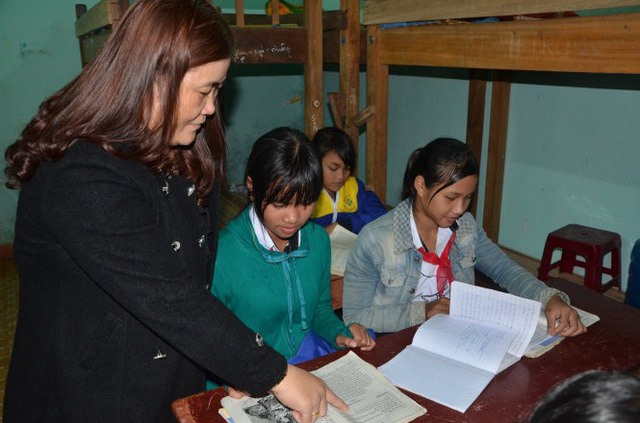 Society
Society

As people rush around getting ready for Tết, many teachers in the northwestern mountains try to bring the festivities to poor ethnic students in remote areas - for two reasons. Firstly, they want to keep the youngsters happy, and secondly, around home firesides, they want to encourage them to return to school after the holidays.
 |
| A class at Ba Vinh Secondary School in central Quảng Ngãi Province. - Photo tuoitre.vn |
HÀ NỘI —As people rush around getting ready for Tết, many teachers in the northwestern mountains try to bring the festivities to poor ethnic students in remote areas - for two reasons. Firstly, they want to keep the youngsters happy, and secondly, around home firesides, they want to encourage them to return to school after the holidays.
Although located in a remote and difficult area of Bảo Yên District in Lào Cai Province, teachers from Tân Tiến Boarding School each year organise a Tết programme to show students how to make chưng (sticky rice) cakes. The teachers also raise funds to buy clothes and gifts for them.
They also visit the families of students in remote areas where the terrain is so rough, it looks like the roads end in heaven.
Teachers from Bảo Yên High School in Lào Cai Province have spent days visiting students’ homes, most of whom come from the Tày, Mong and Dao ethnic groups.
Despite the icy coldness, the teachers crossed springs and roared up slippery slopes to reach remote villages to present Tết gifts.
Quan Văn Thưởng, deputy head of Bảo Yên school, said the school divided teachers into many teams so that they could cover the region quickly and efficiently. They mostly travel by motorbikes or on foot.
Each trip helps the teachers understand the lives and culture of their students, according to one teacher.
Teacher Nguyễn Sỹ Tuấn from Bảo Yên school told the Tuổi Trẻ (Youth) newspaper that travelling 20km up one mountain and then another 10km down the other side to reach homes in Mông Lùng Ác Village made teachers feel the great determination of their students.
The visits also helped students and their parents feel happier about welcoming Tết, he said.
“Gathering with students and their parents around the cooking fire to talk and sing has great meaning and warmth,” teacher Nguyễn Anh Vũ from Lào Cai Province told the newspaper.
Teachers also encourage students, particularly those from remote areas, to return to school after Tết, despite the difficulties.
After a long holiday, students often do not want to return to school. Before and after the Tết holiday, ethnic people have many festivals of their own. Besides, many parents want their children to quit school and work to earn some money for the family.
Ba Vinh Secondary School in central Quảng Ngãi Province’s Ba Tơ District drew lessons from past Tết holidays by asking each teacher to raise awareness about attending school to both parents and students.
Many students are from H’re ethnic group, which has a tradition of enjoying long Tết festivals, which prevent many students from returning to school.
In Tây Trà District, where many people are from the Ca Dong ethnic group, teachers meet the parents of every student to persuade them to let their children go to school. Most of people in the group prefer to take their children into the forest to find wood to sell. — VNS





 Brandinfo
Brandinfo